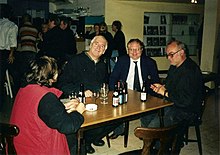|
Jan Bucquoy
Jan Bucquoy (French: [bykwa]; Harelbeke, 16 November 1945) is a Belgian anarchist who has worked in various media (film, comics writing, painting, sculptures, museums). He gained fame for his controversial anti-establishment works and media stunts, which caused many court cases, including for lèse-majesté,[1] copyright infringement and defamation. Between 2005 and 2010 he staged five attempts to attack the Belgian Royal Palace in Brussels and conquer it.[2] Internationally he is best known as a film director, with La Vie sexuelle des Belges 1950–1978 (1994) and the cult film Camping Cosmos (1996) being his most famous films. A recurring theme in his work is Belgitude.[2] CareerAfter his studies in Strassburg (theatre) and Brussels (Insas) he started his career as an author of about 50 comics: ((Daniel) Jaunes, Le Bal du Rat Mort (1986), Retour au pays noir, Alain Moreau, etc...). With his producer Francis De Smet he made his much acclaimed series of The Sexual Life of the Belgians (with the famous trilogy) which includes 10 movies and documentaries about the whereabouts of Belgian people from the period after the war until now: the surrealist Camping Cosmos (1996) with Lolo Ferrari and Jan Decleir, and with a parody (détournement) of Tintin[2] and Snowy and of the play Mother Courage and Her Children by Bertolt Brecht; The Closing down of the Renault Factory at Vilvoorde Belgium (1998) as a Belgian version of Roger & Me (1989) by Michael Moore; Les Vacances de Noël with Noël Godin and Yolande Moreau (2005) etc... He opened the Underwear Museum in Brussels in 2009;[3] in 2016 it moved to its current location in Lessines, Hainaut.[4] InfluencesHis movies are a mixture of French avant-garde cinema in the manner of Jean-Luc Godard (La Chinoise (1967), Tout va bien (1972), Italian neo-realism (Roberto Rossellini) and the humanism of Rainer Werner Fassbinder (Satansbraten (1976), The Marriage of Maria Braun (1979); Bucquoy directed some theatrical plays by Fassbinder during his university studies at Strassburg (The Bitter Tears of Petra von Kant). He is influenced by the Situationist book Society of the Spectacle (1967) by Guy Debord.[2] Films
References
External links
|
||||||||||
